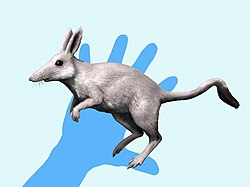| Albertatherium Temporal range: Late Cretaceous, | |
|---|---|
| Scientific classification | |
| Kingdom: | Animalia |
| Phylum: | Chordata |
| Class: | Mammalia |
| Family: | † Alphadontidae |
| Genus: | † Albertatherium Fox, 1971 |
| Type species | |
| †Albertatherium primus Fox, 1971 | |
| Species | |
| |
Albertatherium (meaning "beast of Alberta") is an extinct genus of alphadontid metatherians that lived during the Late Cretaceous of North America. The genus contains two species, Albertatherium primus (the type species), and Albertatherium secundus. Fossils have been found in the Eagle Formation of Montana and the Milk River Formation of Alberta. [1] [2]




